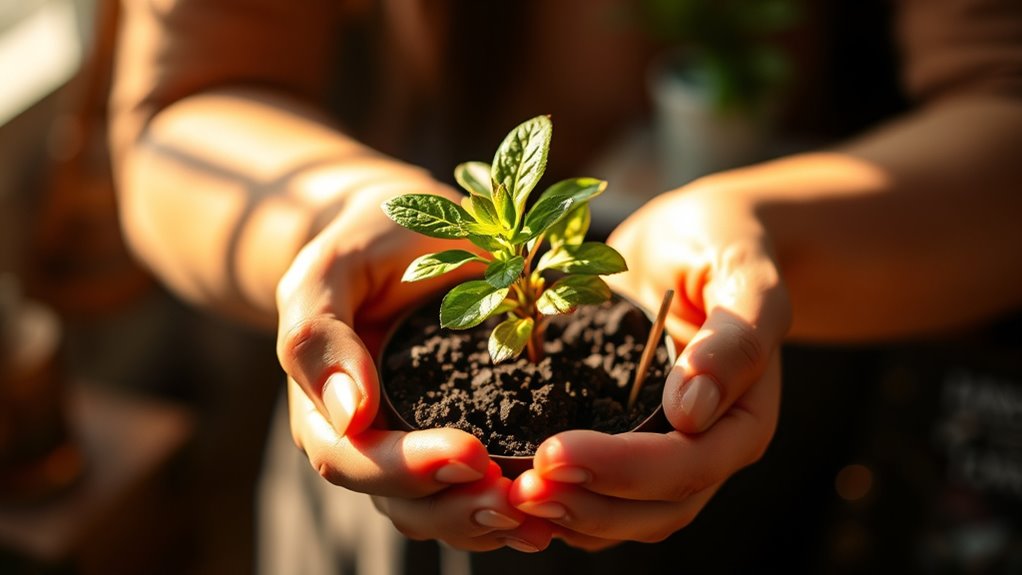To cultivate gratitude, start by keeping a daily journal of three things you’re thankful for. Practice mindful appreciation, like savoring meals or reflecting on positive experiences. Engage in kindness and acts of service, which boost feelings of connection. Recognize and address barriers like envy or cynicism, and incorporate inspiring quotes or visualization to reinforce positive feelings. As you continue exploring, you’ll discover practical ways to deepen your gratitude and enhance your well-being.
Key Takeaways
- Practice daily gratitude journaling to enhance awareness of positive experiences and foster appreciation.
- Incorporate mindfulness and visualization techniques to reinforce feelings of thankfulness and emotional resilience.
- Address psychological barriers like envy or entitlement to develop genuine gratitude and improve well-being.
- Engage in acts of kindness and reflection on past hardships to deepen gratitude and social connection.
- Create a supportive environment and seek inspiration through quotes to sustain a grateful mindset.
Understanding the Benefits of Gratitude

Understanding the benefits of gratitude reveals how this simple practice can substantially improve your mental, physical, and social well-being. When you regularly practice gratitude, you experience greater happiness and overall well-being. It can also reduce symptoms of anxiety and depression, helping you feel more balanced.
Gratitude fosters positive emotions, making it easier to appreciate good experiences and build resilience against stress and psychological pain. Physically, it promotes healthier lifestyle choices, improves sleep, and reduces heart disease risk. Additionally, incorporating vetted products such as oils for relaxation or techniques for emotional well-being can enhance your gratitude practice. Recognizing the positive effects of gratitude on emotional regulation can motivate you to integrate such habits into your daily routine.
Practicing gratitude boosts positive feelings and resilience while supporting better sleep and heart health.
Gratitude also influences your brain, enhancing emotional regulation and neural connectivity. This connection is supported by research showing how gratitude can positively affect personal debt forgiveness by reducing feelings of entitlement or resentment. Scientific studies indicate that practicing gratitude can lead to changes in brain regions associated with positive emotions, strengthening emotional resilience over time. Dog names and their unique qualities can also serve as a reminder of the importance of appreciation and connection in life. Socially, it strengthens bonds, boosts empathy, and encourages prosocial behavior.
Over time, these benefits can lead to longer, healthier, and more fulfilling lives, proving that gratitude is a powerful tool for improving your overall quality of life.
Simple Practices to Cultivate Gratitude

Practicing gratitude doesn’t have to be complicated; simple activities can help you cultivate a more thankful mindset every day. Start by keeping a gratitude journal, where you write down three things you’re thankful for each day.
You can also practice mindful eating, appreciating how your food nourishes your body. Writing heartfelt gratitude letters to others or taking walks to notice your surroundings helps deepen your appreciation. Engaging in cultural breakfast traditions can also serve as a reminder to be grateful for diverse culinary experiences and the connections they foster.
Using a gratitude jar—writing down things you’re grateful for on slips of paper—allows for future reflection. Additionally, expressing thanks through handwritten notes or acknowledging others’ efforts fosters connection. Incorporating electric bikes into your routines can also serve as an example of sustainable and innovative ways to appreciate modern technology. Recognizing the importance of legal residency requirements can help you understand the context of different processes in life. Being aware of pinball machine weights is essential if you plan to set up or move machines at home, ensuring safety and proper handling.
Incorporate mindfulness with daily gratitude reflections or meditation, and make it a habit to share your appreciation with loved ones. Recognizing the impact of positive habits like these can significantly enhance your overall sense of well-being. These straightforward practices can considerably boost your gratitude daily.
The Neuroscience Behind Feeling Grateful

Feeling grateful triggers specific areas in your brain that process social rewards, moral judgments, and emotional experiences. When you feel gratitude, activity ramps up in the medial prefrontal cortex (MPFC), which helps with moral reasoning and understanding others’ perspectives.
The anterior cingulate cortex (ACC) becomes active, linking gratitude to reward and moral cognition. The insula processes basic emotions tied to gratitude, while regions involved in value judgment also light up, reflecting how you assess the significance of kindness or support. These neural responses are influenced by beauty-related experiences, which can amplify feelings of gratitude and social connection. Research indicates that positive emotional experiences can further strengthen these neural pathways and promote emotional resilience. In addition, studies on AI safety suggest that cultivating positive emotional states can enhance social cognition and moral understanding, reinforcing the importance of gratitude in fostering social bonds.
Additionally, the ventral and dorsal parts of the MPFC support rewarding social interactions and empathy. These neural responses not only foster feelings of connection but also promote emotional health, happiness, and resilience by strengthening your brain’s capacity for social cognition and moral understanding.
Moreover, engaging in practices like gratitude exercises can enhance these neural pathways, further enriching your emotional well-being.
Overcoming Barriers to Gratitude

Many common barriers can block your ability to experience gratitude, but recognizing and addressing these obstacles is key to overcoming them. Traits like envy, materialism, narcissism, and cynicism focus your attention on what’s missing or unfair, making it harder to appreciate what you have.
Recognizing traits like envy and cynicism helps us overcome barriers to genuine gratitude.
Psychological factors such as adaptation, entitlement, and resentment create emotional roadblocks that prevent genuine thankfulness. Cultivating a gratitude routine can help counteract these tendencies and foster a more appreciative mindset. Incorporating gratitude journaling into your daily life can significantly enhance your recognition of the good around you.
Additionally, understanding the contrast ratio of your environment can influence your ability to see things in a more positive light, making it easier to cultivate gratitude even in challenging settings. Recognizing the skin type and its influence on your tanning process can serve as a metaphor for appreciating your natural qualities and limitations.
Moreover, engaging with AI-generated music that resonates with your emotional state can facilitate a deeper sense of appreciation and mindfulness, especially when combined with dynamic communication exercises for couples that promote emotional connection and understanding.
Incorporating Gratitude Into Daily Life

How can you seamlessly weave gratitude into your everyday routine? Start by keeping a daily gratitude journal, jotting down three things you’re thankful for each day. Make it a habit to thank at least one person daily, whether with a smile, a note, or a compliment. Replace negative phrases like “sorry” with “thank you” to shift your mindset. Incorporate mindfulness exercises, focusing on sensory experiences or reflecting on inspiring quotes to deepen your appreciation. Performing small acts of kindness and volunteer when possible to foster gratitude toward others. Additionally, reflect on past hardships to recognize your growth. Incorporating organized spaces into your environment can also serve as a foundation for cultivating gratitude by creating a calm and functional setting that supports your well-being. Engaging with visionary quotes can inspire new perspectives and reinforce your commitment to gratitude practices. Practicing visualization techniques can help reinforce positive feelings and strengthen your emotional alignment with your goals. Developing a gratitude mindset can gradually embed gratitude into your life, boosting your mood, strengthening relationships, and enhancing overall well-being.
Frequently Asked Questions
Can Gratitude Practices Help Improve Mental Health Long-Term?
Yes, gratitude practices can help improve your mental health long-term. When you regularly focus on what you’re thankful for, you train your brain to notice positive aspects in life, reducing stress and symptoms of anxiety or depression.
Activities like journaling or expressing gratitude strengthen neural pathways associated with positive emotions, leading to lasting mental health benefits. By making gratitude a habit, you boost your overall well-being and foster a more optimistic outlook.
How Do Cultural Differences Influence Gratitude Expression?
You might notice that how you say thank you varies around the world—sometimes with a smile, other times through gift-giving or even silence.
Cultural differences shape gratitude in many ways: some value modesty, others directness, and nonverbal gestures often speak louder than words.
Recognizing these nuances helps you connect more deeply with others, respecting their cultural norms, and expressing appreciation in a way that truly resonates.
Is There an Ideal Time of Day to Practice Gratitude?
You might wonder if there’s an ideal time to practice gratitude. It really depends on your routine and preferences.
Many find mornings helpful to start the day positively, while others prefer bedtime to reflect on the day’s blessings.
Lunchtime or commuting are also great options to pause and appreciate.
The key is consistency—choose a time that fits smoothly into your schedule to build a lasting habit.
Can Gratitude Reduce Feelings of Loneliness or Social Isolation?
Yes, gratitude can help reduce feelings of loneliness and social isolation. When you focus on positive interactions and express thanks, you notice supportive gestures from others, strengthening your relationships.
Practicing gratitude encourages you to connect more deeply, build new bonds, and foster a sense of belonging. Simple acts like keeping a gratitude journal or sharing thanks daily can boost your mood and make you feel less alone.
What Are Effective Ways to Teach Children Gratitude?
To teach children gratitude effectively, you should incorporate daily routines like sharing thanks during meals or bedtime.
Encourage activities such as writing thank-you notes or creating a gratitude jar.
Model gratitude yourself and involve children in community service or acts of kindness.
Use storytelling, arts, or songs to make gratitude engaging.
Consistently discussing and practicing appreciation helps children understand its importance and develop a genuine sense of gratitude.
Conclusion
By embracing gratitude, you open yourself to happiness and connection, transforming everyday moments into sources of joy. While challenges and negativity may try to overshadow your outlook, choosing gratitude acts as a beacon of hope, guiding you toward positivity. It’s a simple shift with profound power—like turning on a light in a dark room. So, keep cultivating gratitude daily, and watch how it brightens your life, even amid life’s inevitable shadows.










